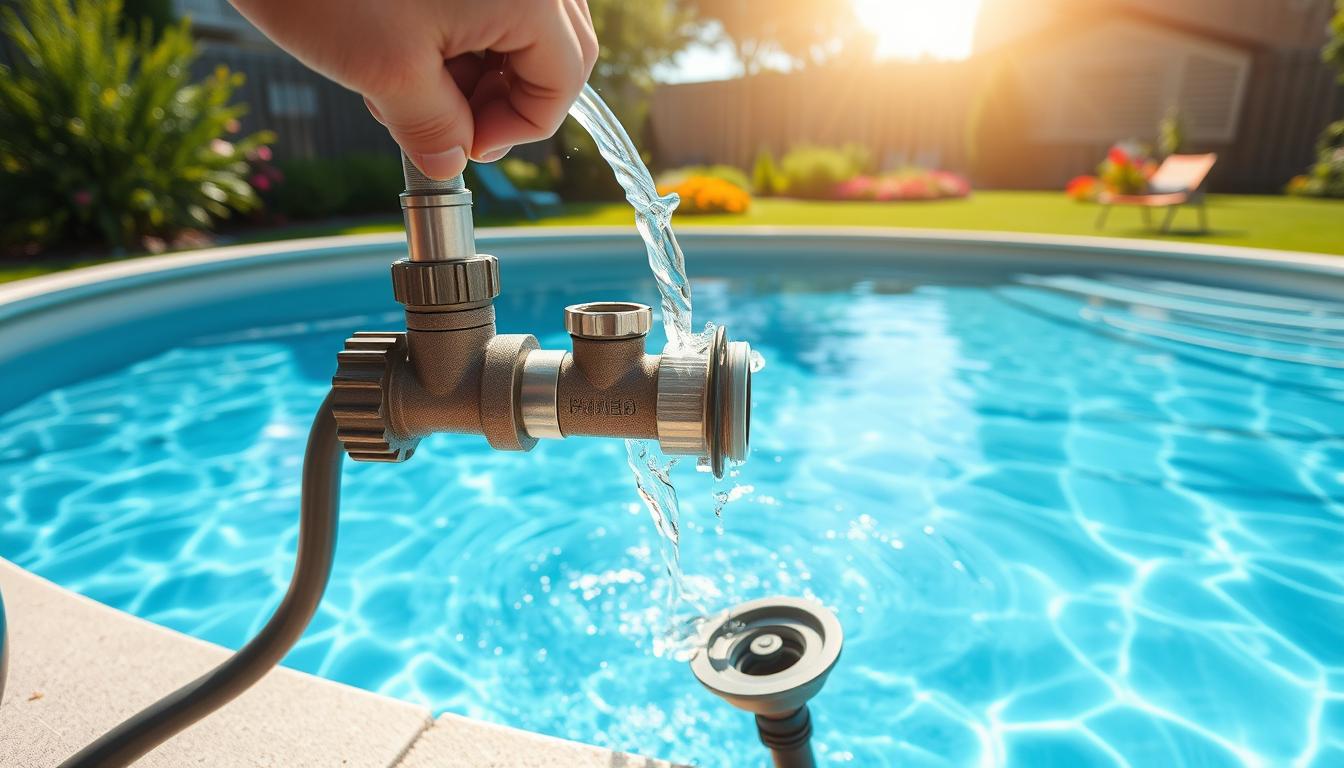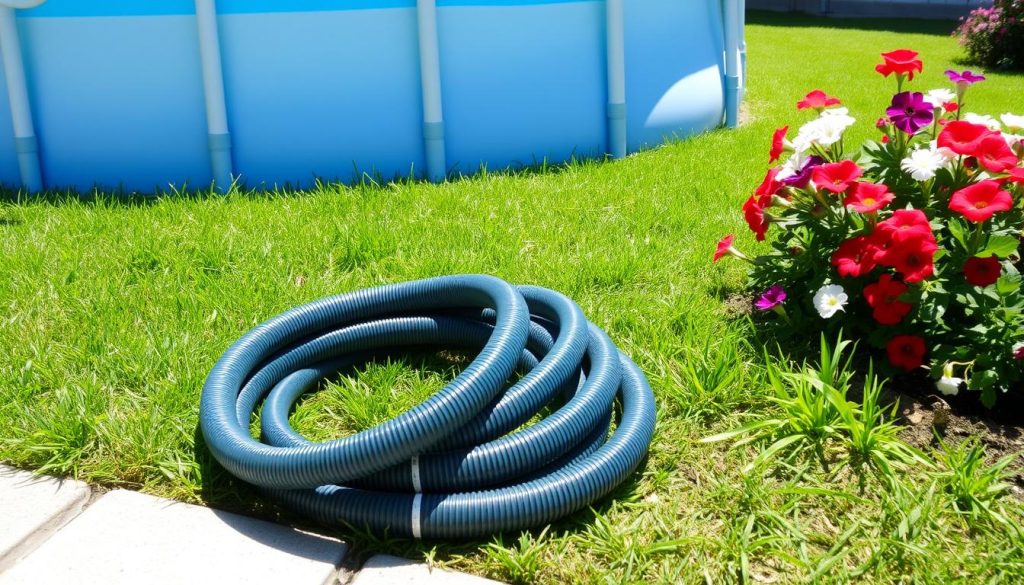
Our above-ground pool brings joy, but it also needs care. Last summer, we noticed cloudy water and high pressure on our Hayward pump. We learned it was time to backwash our sand filter.
Backwashing removes debris and restores good filtration. It’s a simple process that keeps pools clean and healthy. This skill is valuable for all pool owners, regardless of brand.
Our guide will show you how to backwash your above-ground pool. We’ll cover when to backwash and how to use the backwash valve properly.
Understanding the Importance of Backwashing Your Above Ground Pool
Regular backwashing keeps your above ground pool clean and healthy. It removes dirt and debris trapped in the filter system. This process ensures clear water and efficient filter operation.
Backwashing extends your filter’s life and maintains a sparkling clean pool. Make it a part of your pool care routine for best results.
Benefits of Regular Backwashing
Regular backwashing offers numerous benefits for your above ground pool, including:
- Maintaining water clarity and quality
- Preventing algae growth and bacterial buildup
- Extending the life of your pool filter
- Improving the efficiency of your filtration system
- Reducing the need for frequent chemical treatments
Frequent backwashing keeps your pool safe and enjoyable. It ensures a clean environment for you and your family.
Signs Your Pool Filter Needs Backwashing
It’s crucial to spot signs that your pool filter needs backwashing. Look out for these common indicators:
- Increased pressure in the filter tank: When the pressure gauge on your filter reads 10-15 psi above the normal operating level, it’s time to backwash your sand filter.
- Reduced water flow from the return jets: If you notice a decrease in water flow from the return jets, it may be a sign that your filter is clogged and needs backwashing.
- Cloudy pool water: If your pool water appears cloudy or murky despite regular chemical treatment, it could be a sign that your filter is not functioning properly and requires backwashing.
Backwashing a DE filter is a temporary fix. It’s useful when a complete teardown isn’t practical. Sand filters are ideal for backwashing.
There’s no need to add DE, avoiding errors that could lead to a dirty pool.
Weekly routine of skimming floating debris reduces strain on the pump basket, while routine upkeep for both above-ground and in-ground pools ensures safe swimming environments.
Monitor your pool filter’s performance regularly. Watch for signs of trouble and address issues promptly. Regular backwashing maintains a clean, healthy swimming pool.
Preparing to Backwash Your Above Ground Pool Filter
Gather all necessary tools before backwashing. This ensures a smooth process and minimizes potential issues. Let’s look at what we need to prepare.
Gathering Necessary Tools and Equipment
You’ll need a backwash hose long enough to reach a suitable drainage area. Connect it to the waste port of the multiport valve. Find a clean area for waste water discharge.

Identifying Your Filter Type
Above ground pool filters come in three main types: sand, diatomaceous earth (DE), and cartridge. Each has unique maintenance requirements. Check your owner’s manual to identify your filter type before proceeding.
| Filter Type | Lifespan | Backwash Frequency |
|---|---|---|
| Sand Filter | 5-7 years | Every 2 weeks |
| DE Filter | 10+ years (with proper care) | Every month |
| Cartridge Filter | 1-3 years (with regular maintenance) | N/A (requires cleaning) |
Locating the Backwash Valve
The backwash valve, or multiport valve, is crucial for backwashing. It’s usually on top of the filter tank. Connect the backwash hose securely to the valve’s waste port.
Make sure the hose’s other end points towards the drainage area. This prevents mess and damage to the surrounding landscape.
These steps prepare you for efficient backwashing. They help maintain your filter’s efficiency and extend its lifespan. You’ll enjoy crystal-clear pool water for many summers.
Step-by-Step Guide: How to Backwash Above Ground Pool
Backwashing your above ground pool keeps the water clean and clear. This simple task ensures your pool filter works well. Follow these steps to backwash your above ground pool effectively.
Turning Off the Pump and Setting the Valve
First, find the multiport valve on your pool filter. Turn off the pump. Rotate the valve to the “Backwash” position.
This redirects water flow through the filter in the opposite direction. It flushes out debris and contaminants.
When backwashing a Hayward pool pump, ensure that the valve is securely locked in the “Backwash” position before turning the pump back on.
Backwashing the Filter
Set the valve and turn the pump back on. Let it run for 2-3 minutes or until the water looks clear. Water will pump out through the backwash hose.
Watch the pressure gauge. A high reading may mean the filter needs more cleaning.
- Sand filters in above ground pools typically require backwashing about twice a year for chemical cleaning.
- DE filters should be backwashed whenever the pressure gauge reads 8-10 psi above the normal range, which is usually between 10 and 20 psi for Hayward pool filters.
Rinsing the Filter
After backwashing, rinse the filter to remove leftover debris. Turn off the pump. Set the valve to “Rinse”.
Run the pump for 30 seconds to a minute. This lets clean water flush through the filter.
| Filter Type | Backwash Frequency | Rinse Duration |
|---|---|---|
| Sand Filter | Every 2 weeks | 30 seconds |
| DE Filter | Every month | 1 minute |
| Cartridge Filter | Every 2-6 weeks | N/A |
Resetting the Valve and Restarting the Pump
Turn the pump off. Reset the valve to “Filter”. This returns water flow to its normal direction.
For DE filters, add fresh DE powder as instructed. This recoats the filter grids.
Turn the pump on. Check the pressure gauge. It should be in the normal range. Your pool is now ready with clean, clear water.
Maintaining Your Above Ground Pool After Backwashing
After backwashing your above ground pool, proper care is vital for clean, inviting water. Test and balance the pool’s chemistry regularly. Focus on chlorine, pH, alkalinity, and calcium levels to prevent problems like algae and cloudy water.
Brush the pool walls and floor often with a sturdy pool brush. This removes debris and sediment, helping the filter work better. Empty the skimmer and pump baskets frequently to keep the filter running smoothly.
Run the filter for 8 to 12 hours daily, depending on pool size and use. Watch the pressure gauge closely. Backwash when pressure rises 8-10 psi above normal or weekly during peak season.
Regular maintenance and backwashing extend your pool’s life and ensure a healthy swimming environment. Monitor water chemistry, clean surfaces, and maintain equipment consistently. This keeps your above ground pool in great shape for years.
If you have concerns about your pool’s performance, ask a professional for expert advice. They can provide guidance tailored to your specific needs and situation.







